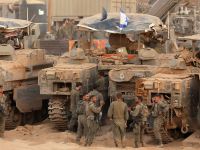By Jon Pattee
Senior English Editor
Albawaba.com - Amman
Algeria, already torn by a decade of religious strife, looks poised to tread on yet another landmine: ethnic violence.
In a wave of rioting last week in their stronghold region of Kabylie, the indigenous Berber people manifested their deep discontent with what they feel is an Arabized government that ignores their economic needs and muffles their mother tongue, Tamazight.
The spark that ignited last week’s violence, which left dozens dead, was the shooting death of a Berber youth while in police custody. But the clashes, which saw Berber students battle riot police in their northeastern mountainous region, grow out of a long-smoldering ethnic conflict.
BURNING GRIEVANCES, BRUTAL WAR
Berbers, who make up about 33 percent of the Algerian population, are fed up with the government’s Arabization policies, which the Berbers feel have left their culture sidelined, if not outright suppressed. Language remains a flashpoint: despite the introduction of Berber language in schools in 1999, activists are still outraged by lawmakers’ attempts to make Arabic the country’s official language.
Meanwhile, complaints of economic marginalization have become intertwined with ethnic strife. Hocine Ait-Ahmed, the exiled president of the Berber-based Socialist Forces Front (FFS), was quoted by AFP as having told France Inter that the Algerian people were "living under increasing poverty," and that young people no longer believed in political change.
The conflict is aggravated by Muslim fundamentalists’ determination to enforce the use of Arabic, as well as their proclamation in 1992 that Islamic law would be enforced nationwide if they came to power. The Berbers, who are mostly identified with secular society, have seen many villagers killed, allegedly by Muslim fundamentalists, as well as folk heroes like outspoken singer Lounes Matoub.
However, this Muslim-Berber violence is a relatively small drop in the larger bloodbath that followed the government’s moves to block the Islamic Salvation Front (FIS) from taking power after it secured a first-round victory in 1992 elections. According to Amnesty International, “Tens of thousands have died since the current conflict began in 1992, thousands have ‘disappeared’ after being taken away by security forces … human rights abuses of the most brutal nature have been committed by security forces, state-armed militias and armed groups.”
DIVIDE AND CONQUER
From one angle, the latest violence is a continuation of the indigenous people’s centuries-old struggle against successive waves of conquerors, from the time of the Romans and Vandals, to the Islamic Fath (conquest) and French colonization.
The policies of the French colonial rulers in particular helped set the stage for the current conflict. A 1995 report by Aicha Lemsine in the “Washington Report on Middle East Affairs” notes that “Under the French, use of the Arabic language became a symbol of backwardness, while the status of non-Arab Berbers was elevated … for 132 years of occupation, the ‘little natives’ were made to repeat phrases like … ‘The nomadic and warlike Arabs still live in tents.’”
Lemsine notes that this “curriculum of division” did not prevent the Algerians from uniting to throw out the French in the 1960s. However, ethnic rifts soon cracked open, with the FFS splitting off from the National Liberation Front (FLN), an overwhelmingly Arabized party which spearheaded the war for independence, and which has kept a tight grip on Algeria ever since.
One reason for the post-independence schism, according to research posted on the website of the Center for International Development and Conflict Management (CIDCM), was the FLN’s “exclusion of Berbers from high-ranking positions within the party” which effectively barred them from important government posts. CIDCM research also points out that the FLN “decided to Arabize Algeria to counter the French colonial influence on their state.”
DANGER ON HORIZON
The decades after the war of independence witnessed demonstrations, paralyzing strikes and increased organization as the Berbers agitated for a better position for their culture and language. Chief among the protest vehicles has been the Berber Cultural Movement (MCB), which directly or indirectly incorporates main Berber civil opposition groups such as the FFS. Despite reports of the emergence of an armed Berber movement, the main avenues of protest have been peaceful.
However, the recent riots in Kabylie raise the question of how long the main Berber struggle will remain within the bounds of civil society. Official Algerian sources point to the country’s constitution, which enshrines Arab, Berber and Islamic culture as the nation’s guiding lights.
But despite President Abdel Aziz Bouteflika’s efforts to incorporate leaders from the Berber Rally for Culture and Democracy into his government, the most recent violence has led the two RCD ministers to resign. And with the toll from the Kabylie riots now at 80 dead and 572 injured, according to press reports cited by AFP, there seems to be no guarantee that the long-buried landmine of ethnic violence will not explode with a vengance.







